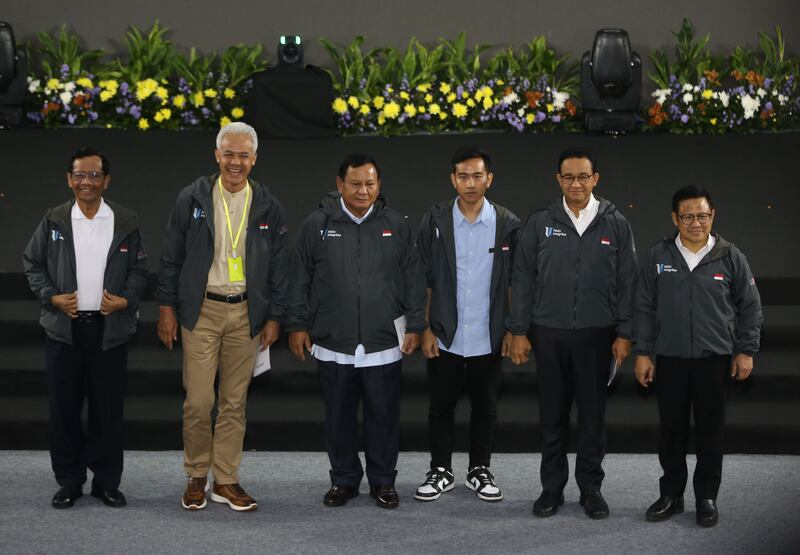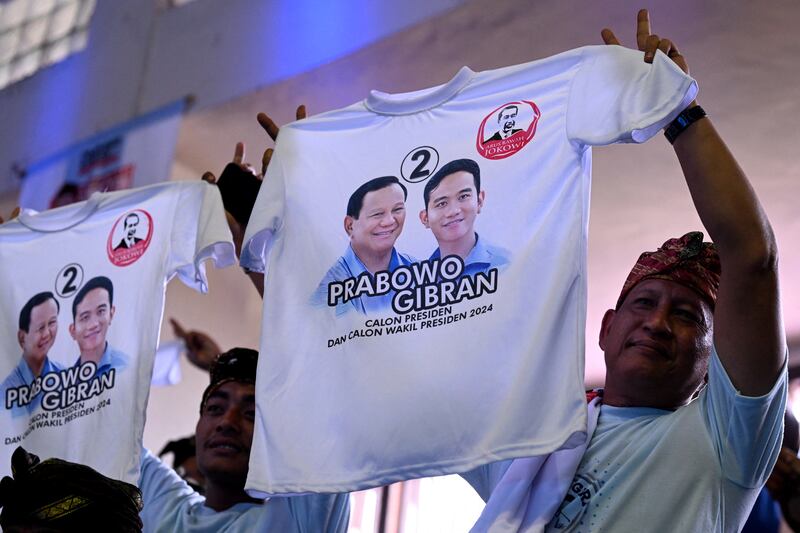The upcoming Indonesian presidential polls may go to a runoff, as the latest surveys show frontrunner Prabowo Subianto failing to secure a majority of votes weeks before the election.
Prabowo, who is the defense minister, and his running mate, Gibran Rakabuming Raka, he eldest son of current President Joko “Jokowi” Widodo, have been clear frontrunners throughout the campaign.
But support for them ahead of the Feb. 14 election is stagnating at 46-47%, according to survey results released Thursday and Friday, which makes a runoff in June a distinct possibility.
Results released Friday of a survey conducted in the first week of January by Poltracking showed Prabowo and Gibran supported by 46.9% of respondents, a mere 0.2 percentage points higher than in the December survey by the same company.
Their closest rivals, former Jakarta Gov. Anies Baswedan and running mate Muhaimin Iskandar, gained ground, reaching 26.7% from 23.8% in December.
The third pair in the presidential race, former Central Java Gov. Ganjar Pranowo and his running mate, top security minister Mohammad Mahfud MD, saw their popularity drop to 20.2%, from 27.6% in December, according to the Poltracking survey.
Indonesia's presidential election system requires a second round of voting between the top two candidates – called a runoff – if no one wins more than 50% of the votes on Election Day. The runoff, if needed, is scheduled for June 26.
Poltracking Executive Director Hanta Yudha said if there were a runoff, he sees Anies and his running mate contesting in it against Prabowo-Gibran, thus maintaining their current poll positions.
“The potential challenger to the Prabowo-Gibran pair in the second round is Anies-Muhaimin,” Hanta Yudha said at a press conference on Friday.

Another pollster, which on Thursday released results from a survey it conducted Dec. 30-Jan. 6, showed results similar to that of Poltracking – Prabowo-Gibran at 45.79%, Anies-Muhaimin at 25.47%, and Ganjar-Mahfud at 22.96%.
"There is a stagnation in the electability of the [Prabowo-Gibran] pair," Indikator Politik Executive Director Burhanuddin Muhtadi said.
Burhanuddin also doesn't see the Ganjar-Mahfud pair making the runoff if one needed to be held.
"If there is a second round, Anies has a bigger chance to qualify with Prabowo," he said.
Meanwhile, local magazine Tempo reported on Sunday that President Jokowi, who has not publicly endorsed any candidate but is seen as favoring the pair that includes his son Gibran, is concerned the election may go to a second round.
He apparently held separate meetings early this month with the leaders of the parties that support Prabowo and Gibran, expressed frustration over the pair’s stagnant performance and questioned efforts to boost their electability, the report said, citing unnamed sources.
At the same time, speculation is heating up that Anies and Ganjar may work together to thwart a Prabowo victory. Some reports citing unnamed sources have said that Anies and Ganjar will support one another if either of them makes it to the second round.
When reporters asked Ganjar on Jan. 9 about whether such an alliance with Anies was being contemplated, he said “everything is possible.”
‘Emotional side’
Prabowo will continue to struggle to boost his popularity, said Ujang Komarudin, a political observer from Al Azhar University Indonesia.
“The poll number of 45% is likely the best he can achieve,” Ujang told BenarNews.
One reason Prabowo hasn't moved ahead decisively in surveys is because he has failed to impress voters with his campaign style and vision for the country, said another political observer.
Firman Noor, of the National Research and Innovation Agency (BRIN), said the electorate has not been impressed with Prabowo's perceived penchant for offering simplistic solutions to complex problems.
"For example, he thinks he can solve every problem with free lunch and free milk," Firman, a research professor of political science at BRIN, told BenarNews.
He was referring to Prabowo's campaign promise to provide free lunches to students across the country to boost their nutrition intake to avoid stunting.
Firman also said Prabowo's image had suffered after two debates among the presidential contenders, which exposed his "emotional side."
For instance, on one occasion, the frontrunner showed his anger when Anies questioned him about hundreds of thousands of hectares of land allegedly controlled by his company.
The minister did not make any efforts at damage control following this incident, “because he is confident that the votes will come to him,” Firman said.

The analyst contrasted Prabowo’s campaign style with that of Anies, who has gained significant ground by appealing to young voters, according to Firman.
Anies’ campaign features townhall meetings with students across the country. He has also won the support of many of Indonesia’s legions of K-Pop fans – Korean pop music lovers – who have volunteered to pay for his campaign advertisements.
Ganjar, on the other hand, who was in the number two spot in surveys for most of last year, has seen his popularity drop as the public perceives he has inconsistent or unclear policies, Firman said.
For instance, Ganjar has criticized the Jokowi government's performance in some areas such as law enforcement, and promised to evaluate a controversial jobs law that was passed last March.
But Ganjar has also promised he will continue with the Jokowi government’s development program.
Both Jokowi and Ganjar belong to the same party, the ruling Indonesian Democratic Party of Struggle (PDIP).
But while Ganjar is the ruling party's official candidate, Jokowi's eldest son is the running mate of one of Ganjar's opponents.
The president’s rift with party chairwoman Megawati Sukarnoputri is no longer a secret.
Separately, Jokowi has been dogged by questions about whether he's trying to build a political dynasty by promoting his family members and loyalists to government.
It didn't help matters when a controversial ruling by the Constitutional Court, helmed at that time by Jokowi's brother-in-law, allowed the president's son, Gibran, to run as vice president with Prabowo.
For Ujang, the political analyst from Al Azhar University, this episode smacked of nepotism and will limit Prabowo’s appeal among the electorate, preventing him from getting a majority of votes.
